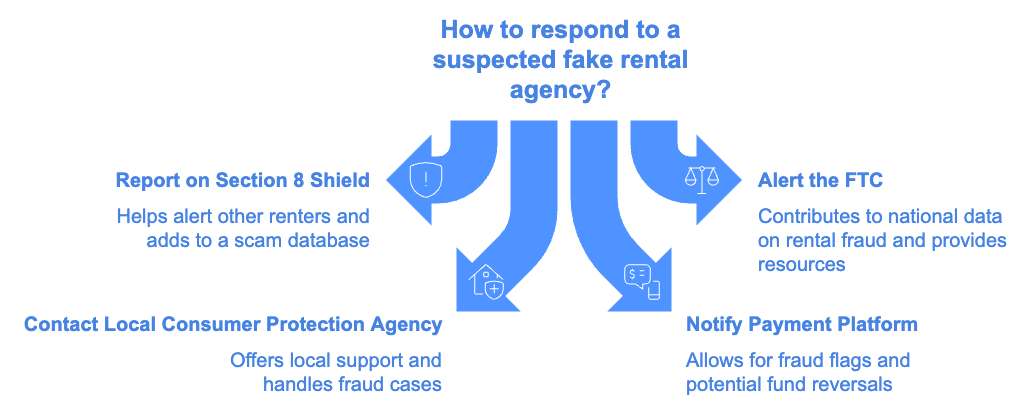
Facebook Rental and Housing Scams: How to Protect Yourself
December 17, 2021
Avoiding Application Fee Scams
March 8, 2022Fake rental agencies are a growing problem in the rental market, preying on those looking for affordable housing by posing as legitimate rental companies. At Section 8 Shield, we’ve gathered insights on how these scams operate and how renters can protect themselves. In this guide, we’ll go over the common tactics used by fake rental agencies, red flags to watch for, and practical steps you can take to avoid these scams.
What Are Fake Rental Agencies?
Fake rental agencies are fraudulent organizations or individuals who pose as property management companies or rental agents to trick renters into paying for non-existent apartments or illegitimate fees. They create convincing websites, fake listings, and even staged office spaces to seem credible, often pressuring renters to act quickly or risk losing out on a “great deal.”
Common Tactics Used by Fake Rental Agencies
1. Fake Listings for Non-Existent Properties
- How It Works: Fake agencies post attractive listings with low rent prices to lure renters. Once contacted, they might give excuses for why the renter can’t view the property right away, such as it’s currently occupied but will be available “soon.” They push for deposits or application fees upfront.
- Warning Signs: The listing’s rent is significantly lower than similar rentals in the area, or the agency has excuses for not arranging a viewing.
- How to Avoid It: Insist on viewing the property in person before paying any fees. Verify the agency’s legitimacy by checking reviews online and contacting local rental boards.
2. High “Application” or “Processing” Fees
- How It Works: Fake agencies often charge high application or processing fees, claiming these are required to secure the rental. Sometimes, they’ll ask for multiple fees for background checks, “priority” processing, or other vague services.
- Warning Signs: Fees seem unusually high or are requested before you’ve seen the property. Legitimate application fees are typically modest and straightforward.
- How to Avoid It: Compare fees with those of other property management companies in your area. Research what’s standard for application fees in your location, and be cautious of any agency that seems excessively expensive.
3. Rushed or High-Pressure Sales Tactics
- How It Works: Scammers often create a sense of urgency, pressuring renters to submit deposits quickly to secure the property. They may claim there’s a high demand for the unit or that it will be gone if you don’t act immediately.
- Warning Signs: The agent is aggressively pushing for a fast decision, urging immediate payment, or using scare tactics to get you to act.
- How to Avoid It: Take your time and don’t feel pressured. A legitimate rental agency will give you time to review your options and will not pressure you into a decision without proper information.
4. No Physical Office or Verifiable Contact Information
- How It Works: Fake agencies often operate without a physical office or will list false addresses to seem legitimate. They may only communicate through phone, email, or a website with no verified physical location.
- Warning Signs: No office location is provided, or the address doesn’t check out when searched online. Limited contact options or poor-quality websites can also be red flags.
- How to Avoid It: Verify the agency’s address and contact information. Search online for their physical office and check reviews on reputable sites. If they can’t provide a legitimate address, reconsider working with them.
5. Requesting Untraceable Payments
- How It Works: Fake agencies often ask for deposits or fees through untraceable methods like cash, wire transfers, or cash transfer apps (e.g., Venmo, Cash App) that make it difficult to recover money if something goes wrong.
- Warning Signs: The agent insists on cash, wire transfers, or digital payments that lack protections or tracking.
- How to Avoid It: Avoid using untraceable payment methods. Insist on secure payment options, like checks or credit cards, which can provide more recourse in case of fraud.
6. Vague or One-Sided Lease Terms
- How It Works: Fake agencies may provide leases with vague or unfair terms that protect only the agency and offer no rights or protections to the renter.
- Warning Signs: If the lease terms are unclear, one-sided, or missing key details like maintenance responsibilities and tenant rights, it’s likely a red flag.
- How to Avoid It: Carefully read any lease agreement and ask for clarification on any terms that seem unclear. Don’t sign a lease that feels rushed or lacks crucial information. Compare it with standard lease agreements in your area to ensure it meets legal norms.
Red Flags to Watch for in Fake Rental Agencies
| Poor or No Online Presence | Legitimate agencies usually have an online presence with reviews, social media, and a professional website. If the agency has no reviews, no social media presence, or a poorly designed website, proceed with caution. |
| Conflicting or Inconsistent Information | Scammers often make mistakes in their own listings, with conflicting information on rent, location, or apartment details. Cross-check their listings and confirm that the information matches across all platforms. |
| Inability to Provide References or Credentials | Legitimate agencies can provide references or credentials when asked. Fake agencies often have vague answers or avoid providing such details. |
| Immediate Payment Demands Before Viewings | Be wary if the agency demands payment or fees before you’ve even toured the property. No legitimate agency will require full payment before you see the property in person. |
How to Verify a Rental Agency’s Legitimacy
1. Check with Local Housing Authorities
- Many cities or counties have registries of licensed property management companies. Contact your local housing authority or licensing board to verify if the agency is legitimate.
2. Look for Reviews on Trusted Websites
- Check reputable sites like the Better Business Bureau (BBB), Yelp, or Google Reviews for feedback about the agency. Look for recurring complaints, such as reports of fake listings or unreturned deposits.
3. Verify with Real Estate Associations
- Many legitimate rental agencies are members of local or national real estate associations. Look for memberships with associations such as the National Association of Residential Property Managers (NARPM) or the local real estate board.
4. Ask for Proof of Property Management License
- Many states require agencies to have a property management license. Ask the agent for their license number and verify it with your state’s licensing authority. Legitimate agents should be able to provide this information without hesitation.
5. Cross-Check Listings on Multiple Platforms
- Scammers often post on multiple free listing sites but avoid official ones like MLS (Multiple Listing Service). Compare the listing with similar units on trustworthy sites like Zillow or Apartments.com to confirm consistency.

Staying Safe from Fake Rental Agencies
Fake rental agencies can be convincing, but you can avoid scams by verifying credentials, avoiding high-pressure tactics, and using secure payment methods. Section 8 Shield is here to provide resources, guidance, and tools to help you navigate the rental market safely. Don’t let pressure or “exclusive deals” rush you into decisions. Take your time, do your research, and stay alert to protect yourself from fake rental agencies.




